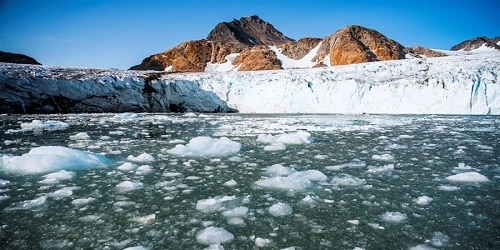The Intergovernmental Panel on Climate Change (IPCC) “Special Report on the Ocean and Cryosphere in a Changing Climate (SROCC)”, has warned on rising seas, storm surges and melting permafrost. It is a draft of a major United Nations (UN) report obtained by AFP (Agence France-Presse), slated for release Monaco on September 25, 2019.

Key Points:
- The ocean has absorbed about a quarter of manmade greenhouse gases since the 1980s and more than 90% of the extra heat they generate in the atmosphere. As a result, it has become warmer, more acidic, and less salty.
- The concentration of life-giving oxygen in marine environments has dropped 2% in 60 years, and is on track to lose another 3-4% by 2100 at current rates of carbon pollution.
- In the 22nd century, the pace of sea level rise is likely to increase 100 fold from 3.6 millimetres per year today to “several centimetres” annually.
- Globally, 20 to 90 percent of coastal wetlands are projected to be lost by 2100, depending on sea level rises.
- Earth’s two ice sheets, sitting atop Greenland and Antarctica, have shed on average more than 430 billion tonnes of mass each year since 2006, becoming the main driver of sea-level rise.
- Average annual runoff from glaciers in most mountain regions will have peaked and begun to decline by 2100.
- A third to 99% of the world’s top-layer permafrost to a depth of about three metres could also melt by 2100 if carbon pollution continues unabated, potentially releasing a carbon bomb of greenhouse gases.
- The amounts of toxic mercury and other “legacy contaminants” in drinking water are expected to increase with the melting of glaciers and permafrost, which may store nearly 800,000 tonnes of mercury – twice the amount found in all other environments combined.
- By 2100, “annual flood damages are expected to increase by two to three orders of magnitude,” or 100 to 1,000 fold.
- By 2050, many low-lying megacities and small island nations will experience “extreme sea level events” every year, even under the most optimistic emissions reduction scenarios.
About IPCC:
♦ Founded: 1988
♦ Headquarters: Geneva, Switzerland
♦ Parent Organization: World Meteorological Organization (WMO)
AffairsCloud Recommends Oliveboard Mock Test
AffairsCloud Ebook - Support Us to Grow
Govt Jobs by Category
Bank Jobs Notification

